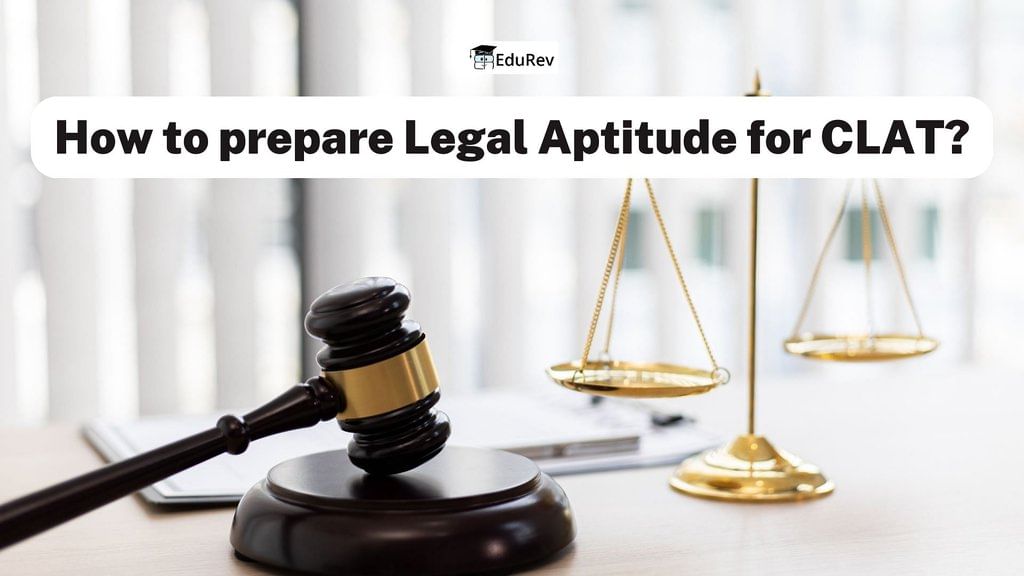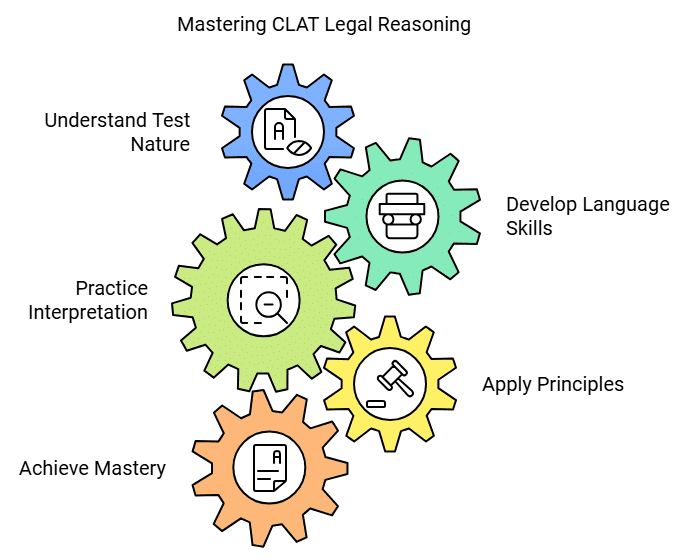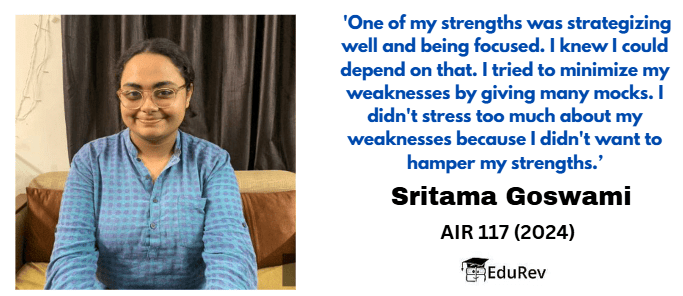How to prepare Legal Reasoning for CLAT? | CLAT Mock Test Series 2026 PDF Download
| Table of contents |

|
| How to prepare Legal Reasoning Section for CLAT? |

|
| Sample Legal Aptitude Questions for CLAT |

|
| FAQs related to CLAT Legal Reasoning |

|
| CLAT Preparation Material |

|
| Must Read Articles |

|
CLAT Legal Aptitude or Legal Reasoning is a section in law entrance exams that holds maximum weightage and demands candidates to possess good knowledge of fundamentals. Roughly 25% of questions in CLAT Exam will be asked from the Legal Reasoning Section making it one of the most common and important sections of this Law Entrance Exam.

Legal Reasoning- A Tie Breaker Section: CLAT Legal Reasoning section is quite important for an additional reason as it's a tiebreaker section. By tiebreaker section of CLAT, we mean that you get a better ranking with the help of the scores you get in the CLAT Legal Reasoning Section.
How to prepare Legal Reasoning Section for CLAT?
Most students appear in front of their mentors in a state of panic, worried about the many legal principles they need to memorise. The good news is that you are not required to memorise any of them! This is not a test of Legal Knowledge. Instead, they test your ability to interpret the given principle correctly, strictly adhere to it and apply it to the given facts. It is more of a test of language and reasoning skills.
Here are stepwise strategies compiled by EduRev Experts on the guidance of various CLAT toppers which will help you to clear Legal Reasoning for CLAT in an excellent manner.

Step 1: Understand Syllabus and CLAT Legal Reasoning Exam Pattern
CLAT Legal Reasoning questions will mainly follow the pattern of principle-fact-based questions, herein you are provided with a legal proposition (principle) and a set of facts to which the proposition (principle) has to be applied. Legal Aptitude for CLAT has become a comprehension-based aptitude test wherein the questions are indirect and inference-based.

- Legal Reasoning for CLAT section will consist of approximately 28-32 questions, with each correct answer earning one mark.
- A negative marking system will be in place, deducting 0.25 marks for each incorrect answer.
- This section will involve Legal Comprehension, where candidates will read 4-6passages on current or static legal issues, followed by 4-6 questions.
 Question Pattern and Marking Overview
Question Pattern and Marking Overview
- Questions will vary in complexity, with some being straightforward and others focused on Legal Reasoning.
- Straightforward questions will assess a student's ability to draw logical conclusions or provide supportive arguments related to the legal issue presented in the passage, demanding strong comprehension skills.
- The other type of questions will be based on Legal Reasoning, requiring students to make judgments in hypothetical scenarios using the legal knowledge provided in the passage.
CLAT Legal Reasoning Exam Syllabus
In this section, you will be expected to read passages of around 450 words each. The passages may relate to fact situations or scenarios involving legal matters, public policy questions or moral philosophical enquiries. You will not require any prior knowledge of law to attempt the questions in this section. You will benefit from a general awareness of contemporary legal and moral issues to better apply general principles or propositions to the given fact scenarios.
Each passage would be followed by a series of questions that will require you to:
- Identify and infer the rules and principles set out in the passage;
- Apply such rules and principles to various fact situations; and
- Understand how changes to the rules or principles may alter their application to various fact situations.
Step 2: Formulate a Concrete Strategy by Focussing on Important Topics
The thing you should know before starting the preparation for the CLAT Legal Aptitude section is that this section is only going to test your legal reasoning. Legal reasoning is not about knowledge, it’s about reasoning as you can tell from the name. Your knowledge of the law is not being assessed here.

Generally, the passages of legal reasoning are taken from legal journals, newspapers, articles, and editorials involving legal matters, public policy questions, or moral philosophical inquiries.
Here are some of the most important legal reasoning topics you should focus on while preparing for the exam:
- Legal Maxims: Legal maxims are principles of law that have been established through judicial decisions and precedents. Familiarizing yourself with these maxims will help you understand the basic principles of law and their applications in different situations.
- Constitutional Law: This topic deals with the principles and provisions of the Indian Constitution, including fundamental rights, directive principles, and the separation of powers. You must have a sound understanding of the Constitution and its various provisions.
- Criminal Law: This topic deals with the principles and provisions of the Indian Penal Code and other criminal laws. Understanding the different types of crimes, their punishments, and the legal procedures involved in criminal cases is essential.
- Contract Law: This topic deals with the principles and provisions of contract law, including the different types of contracts, their formation, and their enforceability. You must know the legal terminology used in contracts and their interpretation.
- Tort Law: This topic deals with the principles and provisions of tort law, including negligence, nuisance, and defamation. You must know the different types of torts and their legal implications.
- International Law: This topic deals with the principles and provisions of international law, including international treaties and agreements, human rights, and international organizations.
CLAT Legal Reasoning can be divided into 3 categories:
(i) Legal Theory
(ii) Current Legal Affairs
(iii) Legal Maxims, Foreign Phrases & Legal Terms
Here's how you can tackle them individually:
(i) Legal Theory:
Lot of you would be of the opinion that what is the need of studying legal theory because the pattern has changed and the passage that will come in the exam would be related to some legal concept or some general legal news. But studying the Legal Theory portion is important for you to understand the passage.
Reading Legal Theory on regular basis is very important to understand the concepts and to apply those concepts in your factual situation so that you can easily figure out the answer.
The following topics are covered in the Legal Theory-
- Torts
- Contracts
- Criminal Law
- Constitutional Law
- International Law
- Intellectual Property Law
- Family Law
- General Legal Principles
The above topics are written in order of their importance, For example, we can say that Torts, Contracts, and Criminal Law are the most important topics.
You should start with reading the Constitution of India, Criminal Law, Torts, Contracts, Family Law and Miscellaneous Laws like: Concepts of CRPC, Basic Consumer Laws, Basic Environmental Laws. Terms and concepts of various laws
(ii) Current Legal Affairs:
Recent judgments and questions on the legal field related to legal affairs will be asked under this section.
- These are also current affairs but in legal domain, the following things can be asked about under this topic:
- Any new appointment in the Supreme Court, any judge who gets appointed to the supreme court or new chiefs justice appointed to any high court.
- Any new committee is formed and some major decisions are taken by those committees. - Landmark Judgements of Supreme Court/ High Court.
- Previous one-year legal-related issues are important.
- For Current Legal Affairs Completely stick to a single source.
- Make notes and update them week-wise and month-wise.
(iii) Legal Maxims, Foreign Phrases & Legal Terms:
Direct Questions from these topics might not come. However, this section will require you to have basic knowledge of concepts of law and other legal principles and Latin terms which are used in Law.
- No need of mugging up: There is no need of mugging up this section. Instead reading legal theory multiple times and properly will enable you to understand often used legal terms, foreign phrases, and maxims.
- Do not devote much time to this section: As chances are the things which you are studying might not get asked and completely new terms/ phrases etc. are asked. So, no need to put in great efforts for the preparation of this section.
- Prepare this section by attempting mocks: You can cover this section by attempting tests or mocks that you will give over time. Make sure you prepare the entire segment through these tests and by giving multiple readings to legal theory.
- Legal Vocabulary: Improve your legal vocabulary including legal jargons, legal terms, foreign phrases, and maxims.To improve this area, go through the list of such terms with their meanings multiple times will help.
Do not forget to have a look at following important topics:
- Supreme Court of India
- Ministries & Departments
- Ministry of Law and Justice
- Facts about Indian Constitution
- Government of India
Step 3: Collect Required Study Material and Improve your Reading Speed
CLAT is a lengthy paper in which candidates are required to read complex legal and non-legal texts in a short time. So, the focus should be on increasing reading speed while studying legal awareness.

- Enhance Your Reading and Comprehension: Enhancing your reading and comprehension skills is vital to tackle the Legal Reasoning section of the CLAT exam. Read legal articles, judgements, and editorials to improve your reading skills. Analyze the information provided and try to draw inferences and conclusions based on it.
- Editorials, Articles, News Analysis, Journals & Legal Documents: To improve reading as well as analytical skills required for CLAT, candidates should read the editorials, articles, news analysis, journals, and legal documents.
- Read about Landmark judgments and important cases: Focus on the legal issues from the last 10 months and read about them. Special attention should be paid to landmark judgments and important cases from the last year.
- Amendments and Enactments: Read about all the new amendments and enactments done in both monsoon and winter sessions of the parliament along with contemporary issues like LGBTQ rights or the death penalty which have been a part of the news in the last few months.
- For Factual and Conceptual knowledge: The factual and conceptual knowledge can be obtained through reading the standard CLAT preparation books such as the legal aptitude book authored by A P Bharadwaj, or Indian polity by Laxmikant.
- Study Material: Some of the important study material that candidates can refer to are suggested below:
- LexisNexis Butterworths
- Legal Awareness and Legal Aptitude by AP Bhardwaj
- Universal’s CLAT Guide
- Newspapers such as - The Hindu and The Indian Express
- Legal journals
- Legal current affairs
- News and editorial analysis
Step 4: Make a Timetable and allocate a few hours Daily for CLAT Legal Reasoning
Allocate at least 2 hours daily to your CLAT Study Plan for Legal Reasoning. Consistency is key in mastering Legal Reasoning. Invest regular time to cover topics, attempt questions, and revise concepts.
- Complete 3-4 Topics Every Day: Complete around 3-4 topics each day and aim to cover each topic comprehensively. Try to understand the basic legal principles and their practical application in various scenarios. Attempt chapter-wise questions and ensure that you can apply the concepts to different scenarios.
- Daily: Read for at least one hour: Improve your reading speed by reading whatever you like, Read novels and magazines so start reading newspapers every day whether you like it or not.
- Weekly: Practice well Legal Reasoning Comprehension Questions at least twice a week. Practice not just includes attempting the questions and checking the right answer. Attempt questions and analyze them properly.
Look for all the mistakes that you have committed.
Look for all the questions that you couldn't solve.
Look for all the wrong answers that you marked.
Fortnightly: Revise Legal Theory. At least revise theory of a particular topic once in 15 days.
- Reading newspapers are utmost important: Newspaper is the only one document that will help you in each and every section of CLAT. News of legal will get covered from newspaper, it will help you in comprehension and will help you increase your reading speed.
- Regularly Revise Chapters: Consistently revise each chapter daily to reinforce your understanding of the legal principles. Revise the concepts, legal terms, and practical application of the principles. This will help you retain the information better and improve your ability to apply legal reasoning concepts in the exam.
Step 5: Know How to Answer CLAT Legal Aptitude Questions?
Here are a few CLAT Legal Aptitude Preparation Tips you can follow to quickly answer all the questions asked in the Legal Aptitude section:
- From this year onwards, facts and principles will not be given separately.
- Make sure to read the passage and the Legal Aptitude questions thoroughly to identify the principles.
- You do not have much time to spend reading questions again and again. So, make sure you read it focusing on the first time, our expert Harsh emphasis.
- After a thorough reading, try to relate the facts drawn with the question and analyze if they fully support/ justify the argument without any assumptions.
- Please pay attention to the small details and identify all the principles and roles in the passage.
- Beware of the minor tweaks given in the statements or questions. Hence, paying attention to detail is key here.
- Try to keep your assumptions outside the principle facts and stick to the theories that the principle is always correct.
- Do not waste more time on a single question if you cannot identify the correct answer.
Step 6: Attempt Mock Tests and Keep in Mind these Tips and Tricks
- First Read the passage carefully: First, read the passage carefully, then try the question. If you don't read the hypothetical situation first, you won't be able to form any opinions and will be able to respond objectively.
- Avoid Superimposing your point of view: The author's point of view is crucial. While answering the questions, avoid superimposing your point of view. Always go with an answer which has clear reference in the passage.
- Mock Tests and Practice tests: Do not miss any Mock Tests or any practice tests. There are no proper reference books available on the new pattern and the only source to practice these questions are the tests provided to you. So take the tests seriously and try to improve your legal comprehension skills through these tests.
- Here are some really good mocks for you to practice:
(i) Full Mock Test -1
(ii) Full Mock Test - 2
(iii) Full Mock Test - 3
(iv) Full Mock Test - 4
(v) Full Mock Test - 5 - Reading Skills: Work consistently on your reading skills.
- Running out of time?: You might land up in a situation where you are running out of time and cannot invest the last three-four minutes left in reading the entire passage. Here, your prior basic understanding of the legal issue will be of great help as you might be able to answer a couple of questions even without reading the entire passage word to word.
Step 7: Practice Previous Year Papers and Achieve
Practice with as many previous year papers as you can get. Make a list of the principles on which questions were framed in the past. Read all of them and then mark a set of principles that have been repeated time and again. And of course, there will be a completely new set of principles every year. Be prepared for anything that you might not have expected.
Previous Year Questions 2024: Legal Reasoning
Previous Year Questions 2023: Legal Reasoning
Previous Year Questions 2022: Legal Reasoning
Sample Legal Aptitude Questions for CLAT
The Common Law Admission Test (CLAT) is a highly competitive entrance exam for law aspirants in India. Over the years, the pattern of the exam has evolved significantly. Until 2019, the Legal Reasoning section typically involved standalone legal principles and facts, requiring candidates to apply legal reasoning to specific situations. However, since 2020, the focus has shifted to a comprehension-based approach, where candidates must read and analyze passages to draw relevant facts, principles, and arguments independently.
Passage
The old woman didn’t like the look or sound of the kid. She scowled at her husband. ‘Where did you pick up this kitten from? Why do we need her?’ When the old man told her she was a goat kid, she picked her up and exclaimed in amazement: ‘Yes, she is a goat kid!’ All night, they went over how the kid had come into their hands.
That same night the old lady gave the goat kid that resembled a kitten a nickname: Poonachi. She once had a cat by the same name. In memory of that beloved cat, this goat kid, too, was named Poonachi. They had acquired her without spending a penny. Now they had to look after her somehow. Her husband had told her a vague story about meeting a demon who looked like Bakasuran and receiving the kid from him as a gift. She wondered if he could have stolen it from a goatherd. Someone might come looking for it tomorrow. Maybe her husband had told her the story only to cover up his crime?
The old woman was not used to lighting lamps at night. The couple ate their evening meal and went to bed at dusk. That night, though, she took a large earthen lamp and filled it with castor oil extracted the year before. There was no cotton for a wick. She tore off a strip from a discarded loincloth of her husband’s and fashioned it into a wick.
She looked at the kid under the lamplight in that shed as though she were seeing her own child after a long time. There was no bald spot or bruise anywhere on her body. The kid was all black. As she stared at the lamp, her wide-open eyes were starkly visible. There was a trace of fatigue on her face. The old woman thought the kid looked haggard because she had not been fed properly. She must be just a couple of days old. A determination that she must somehow raise this kid to adulthood took root in her heart.
She called the old man to come and see the kid. She looked like a black lump glittering in the lamplight on that pitch-black night. He pulled fondly at her flapping ears and said, ‘Aren’t you lucky to come and live here?’
It had been a long time since the couple had such pleasant chit-chat. Because of the kid’s sudden entry into their lives, they talked about the old days.
[Extracted, with edits and revisions, from Poonachi, or the Story of a Black Goat, by Perumal Murugan, translated by N. Kalyan Raman, Context, 2018.]
Question 1: Why did the old woman doubt her husband’s story about how he had got the kid?
(a) Because goat kids are only sold in livestock markets.
(b) She thought the story was vague and that he had stolen it from a goatherd.
(c) Because she did not think Bakasuran was so generous as to gift him a goat kid.
(d) Her husband was a habitual thief and regularly stole things from others.
Rationale: The correct answer is (b) – because she thought the story was vague and that he had actually stolen it from a goatherd. Both these points are set out in the third paragraph. No information in the passage would support the claim in option (a); similarly, there is nothing in the passage to indicate that the old woman thought Bakasuran was not generous, and neither is there any information in the passage to indicate that her husband was a habitual thief, and so, neither (a), (c), nor (d) is correct.
Question 2: Why did the old woman name the goat kid ‘Poonachi’?
(a) Because the kid made small bleating noises that sounded like ‘Poonachi’.
(b) Because the kid reminded the old woman of her husband, whose name was also Poonachi.
(c) Because the old woman had first thought the kid was a kitten, she named it after a beloved cat she had once had.
(d) Because ‘Poonachi’ was the name typically given to goat kids in the area the couple lived in.
Rationale: The correct answer is (c) – because the old woman had first thought the kid was a kitten, and so she named it after a beloved cat she had once had. This is apparent from the first three sentences of the third paragraph. There is no indication of any noises made by the kid in the passage, so option (a) cannot be correct. Similarly, there is no indication of the old woman’s husband’s name in the passage, so option (b) cannot be correct either. Option (d) cannot be correct since there is no information in the passage about what name was typically given to kids in the area where the old couple lived.
Question 3: What does the word ‘haggard’ as used in the passage mean?
(a) Dark in colour and hard to see.
(b) Looking exhausted and unwell.
(c) Direct and outspoken.
(d) Furry and warm.
Rationale: The correct answer is (b) – looking exhausted and unwell. This can be inferred from the information in the fifth paragraph, which indicates a trace of fatigue on the kid’s face and that the old woman thought the kid looked haggard because she had not been fed properly. Both these pieces of information, that is, that the kid looked fatigued, and had not been fed properly, would support the meaning of ‘haggard’ set out in option (b). While the passage also discusses how dark the kid is, this discussion is not related to using the word ‘haggard’ in any way, so option (a) cannot be correct. Nothing in the passage indicates that the kid made any sounds, so option (c) cannot be correct. Neither is there any discussion in the passage about how furry the kid may have been, so option (d) cannot be correct.
Question 4: Why was the old woman not used to lighting lamps at night?
(a) Because the couple usually ate their evening meal and slept at dusk.
(b) Because her daughter used to light the lamps in their household.
(c) Because the couple was very poor and could not afford oil for lamps.
(d) Because the old couple did not usually exchange pleasant chit-chat.
Rationale: The correct answer is (a) – because the old couple usually ate their evening meal and slept at dusk. This is apparent from the first two lines of the fourth paragraph. The passage does not mention the couple’s daughter, so option (b) cannot be correct. Neither option (c) nor option (d) is related to the author’s explanation of why the old woman was not used to lighting lamps at night.
FAQs related to CLAT Legal Reasoning
Q.1. How do I increase the speed of solving legal reasoning questions in CLAT?
- Most of the times the language of correct option will be same as the language of the principle. Try to comprehend the principle first then move to the question, once you have understood the principle, it's a cakewalk to solve the question, just keep one rider in mind that the language of the principle and the correct option will mostly be same or on similar lines.
- When it comes to legal reasoning questions, you would notice that the more you practice, the more your speed is. You will be able to increase your speed gradually through practice.
Q.2. What should be an ideal strategy for solving legal reasoning in the new CLAT pattern and tackle the lengthy passages?
- Focus on the legal issues from the last 10 months and read about them.
- Special attention should be paid to landmark judgments and important cases from the last year.
- Read about all the new amendments and enactments done in both monsoon and winter sessions of the parliament along with contemporary issues like LGBTQ rights or the death penalty which have been a part of the news in the last few months.
- Reading about static and current legal issues of the recent year will help you in understanding the passage easily and at a much faster pace during your final exam.
- Secondly, you might land up in a situation where you are running out of time and cannot invest the last three-four minutes left in reading the entire passage. Here, your prior basic Understanding of the legal issue will be of great help as you might be able to answer a couple of questions even without reading the entire passage word to word.
Q.3. Is there negative marking in the CLAT Legal Reasoning Section?
Yes, there is negative marking in the CLAT Exam, including the Legal Reasoning section. One-fourth (0.25) marks will be deducted for each wrong answer.
Q.4. What is the weightage of Legal Reasoning section in CLAT?
The Legal Reasoning section usually carries a weightage of 25% in the CLAT Exam.
CLAT Preparation Material | |
|
1 videos|37 docs|71 tests
|
















